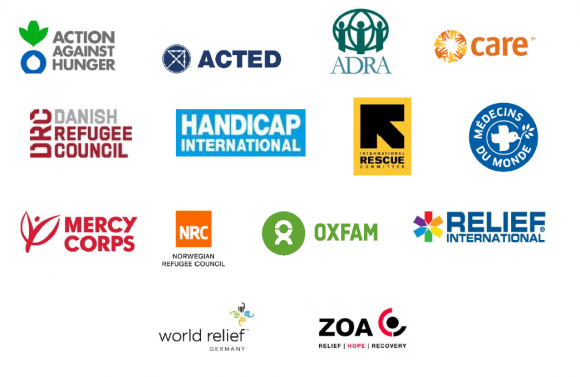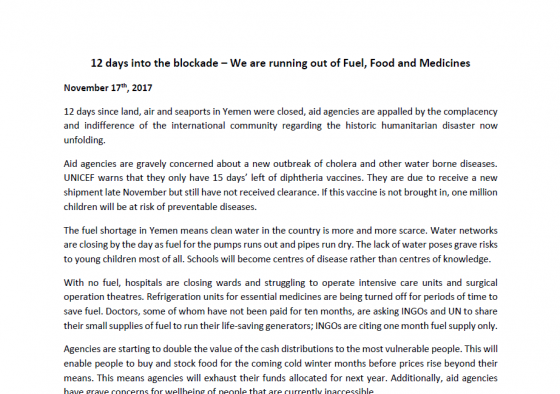12 days into the blockade – We are running out of Fuel, Food and Medicines
12 days since land, air and seaports in Yemen were closed, aid agencies are appalled by the complacency and indifference of the international community regarding the historic humanitarian disaster now unfolding.
Aid agencies are gravely concerned about a new outbreak of cholera and other water-borne diseases. UNICEF warns that they only have 15 days’ left of diphtheria vaccines. They are due to receive a new shipment late November but still have not received clearance. If this vaccine is not brought in, one million children will be at risk of preventable diseases.
The fuel shortage in Yemen means clean water in the country is more and more scarce. Water networks are closing by the day as fuel for the pumps runs out and pipes run dry. The lack of water poses grave risks to young children most of all. Schools will become centres of disease rather than centres of knowledge.
With no fuel, hospitals are closing wards and struggling to operate intensive care units and surgical operation theatres. Refrigeration units for essential medicines are being turned off for periods of time to save fuel. Doctors, some of whom have not been paid for ten months, are asking INGOs and UN to share their small supplies of fuel to run their life-saving generators; INGOs are citing one-month fuel supply only.
Agencies are starting to double the value of the cash distributions to the most vulnerable people. This will enable people to buy and stock food for the coming cold winter months before prices rise beyond their means. This means agencies will exhaust their funds allocated for next year. Additionally, aid agencies have grave concerns for the wellbeing of people that are currently inaccessible.
The country’s stocks of wheat and sugar will not last for longer than three months if cargo vessels are not allowed to discharge in Hodeidah, the country’s only deep-water seaport, in the next few days. Even if they are allowed, food distribution systems have been severely disrupted and may collapse within weeks. Moreover, having incurred so many additional costs and in a highly volatile environment, international traders may decide that importing to Yemen is too risky a proposition to continue.
The international community must break its shameful silence and use all possible means to lift the blockade on Yemen immediately. Hodeidah port, that serviced 80% of all imports, and Sana’a airport, needs to be reopened to let in urgently needed shipments of food, fuel, and medicines. Every day the blockade lasts means thousands of Yemenis will suffer from hunger and preventable diseases. Millions could die in a historic famine if the blockade continues indefinitely. This is not the time for carefully balanced statements. The choice is between resolution or complicity in the suffering; there is no third option.
ACF, ACTED, ADRA, CARE, DRC, Handicap International, International Rescue Committee, Medecins Du Monde, Mercy Corps, NRC, Oxfam, Relief International, World Relief Germany, Zoa

12 days into the blockade – We are running out of Fuel, Food and Medicines
Download